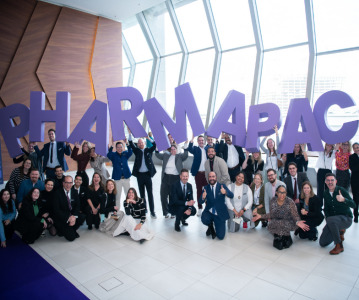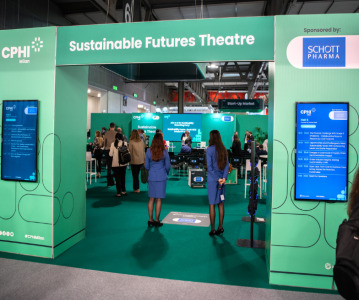CPHI Milan post-show panel: Importance of advocacy projects in business

In the Packaging Innovation Theatre from CPHI Milan this year, sponsored by the Alliance of the RTU, we held a panel on: ‘Elevating Brand Perception: Integrating Advocacy Projects into Business Strategies’. The session aimed to explore how pharmaceutical companies integrate advocacy projects into the core of their business, and how they can implement marketing strategies to address growing scrutiny and the demand for transparency along with social responsibility.
In an in-depth case study with pharma giant Merck, we can easily see how advocacy initiatives can benefit brand perception among consumers and employees, and build trust and loyalty within the community it serves.
The panel, chaired by Agnès Maignien, Head of Content, Informa Markets, consisted of Stecy Yghemonos the Executive Director of Eurocarers, Mihaela Militaru, Senior Director, Patient Insights and Advocacy, MERCK, Maggie Lester, Corporate Head of Benefits, Merck Group, and Amr Adel, Vice President, Global Brand Lead, Global Oncology Business Franchise, Merck KGaA.
Maignien opened the conversation by asking how Merck, who won the At the Heart of Pharma Award at last year’s CPHI Pharma Awards for their advocacy programme, Embracing Carers, how everything started that led them to their project, and to being so continually invested.
Militaru replied: “The inception of the Embracing Carers programme started in 2016 as a joint collaboration between the teams of Government and Public Affairs and Global Healthcare Communications. At the time, what we really wanted to achieve was to launch a differentiated global movement dedicated to both understanding and supporting the implications of caregiving on both the health and finances of carers.”
Merck wanted the programme to be a collaboration with the community heavily involved, to better understand and address the needs of carers. They started working with Eurocarers, Carers Worldwide, the International Alliance for Caregiving Organisations, Carers UK, and the US National Alliance for Caregiving. Everything the company has worked on and achieved since 2017 has been in conjunction with all of these carer organisations, to ensure that it’s really fitting the community they are hoping to serve.
There's more expectation and interest, there is motivation to go deeper and get more information on the patient experience and use this, a lot of technology in recent years has enabled this. The younger generation are much more interested in the 'good causes' the sustainability agenda, the agenda for a project such as this, it's going to be much more popular and will in the future also provide a competitive advantage for your business.
Militaru points out that since 2017 they have supported more than 90 projects on a global scale.
Maignien broaches an important aspect of this kind of work – where do they get the money? It’s no secret that there is a lot of money in the pharmaceutical industry, but how to convince the powers that be that funds need to be allocated to a cause that isn’t directly profitable?
Yghemonos answers directly: “It makes business sense to improve the wellbeing of carers and the provision of care in Europe.”
He cites many advantages including the reduction of absenteeism, work force morale, productivity, and employee satisfaction by having these ethics in place in the business.
He continues: “Very often these initiates are tokenistic, but we've been working with Merck, we have a dialogue that we continue to work on. We collect evidence, connect us with carers, and other organisations all over the world. There are many ways in which embracing carers contributing to the business on a global level.”
Merck has contributed to several globally reaching projects, by working with Eurocarers, they were able to finance, and add expertise and resources that meant an NGO could reach a global audience. One crucial aspect of the partnership is the ability to create a dialogue between the players and ultimately raise awareness of the issues facing carers and the impacts on the wider population.
Maignien concentrates on the idea of awareness, highlighting how many people are carers and don’t even know it themselves, and the knock on effects of this on the provision of care, or carers asking for care.
This is a point that has to be considered in every aspect, and the panel emphasises the need to reach out to local organisations when they’re working globally, because you need to fit in with the local organisations and the local people there to give them the right support.
 Lester answers by saying that you need to consider caregivers holistically, you can’t exclude carers when you’re talking about the employee population: “One caregiver gave me a statistic that from next year, in the UK, there will be more working adults that are caregivers than there are that are supporting young, school-aged children. And of course, there’s a lot of people that are doing both at the same time.”
Lester answers by saying that you need to consider caregivers holistically, you can’t exclude carers when you’re talking about the employee population: “One caregiver gave me a statistic that from next year, in the UK, there will be more working adults that are caregivers than there are that are supporting young, school-aged children. And of course, there’s a lot of people that are doing both at the same time.”
She states that it needs to be recognised by employers more, and employees themselves; caregiving can be really tough, and work can be the relief for many people, being valued for different parts of your life, your skills as an employee. It’s so important that employers recognise this huge employee population, the resources and skills they can bring, and learn how to support them.
She promotes one caregiver employee resource group who have developed an internal training programme based around recognising caregivers, which they have included at Merck as a voluntary training programme. She proudly states that two thirds of the employees completed the training, which is more than 41,000 people. She used this point to highlight the importance of raising awareness, not just externally, but within an organisation, and how this can help people to recognise that they are carers themselves, or how to build a culture that is more inclusive and accessible for caregivers.
The discussion moved on to questions from the audience, where the panel was asked to elaborate no some more ways they spread support.
Militaru answered that there’s a multitude of ways, whether its awareness campaigns, videos, brochures, events, or support for initiatives led by others. Merck takes care to speak with people on the ground, through surveys and other means to inform their work and the message that they are putting out.
The panellists make final points regarding the impact of the pandemic on caregivers, their mental health, and how that changed how they work in a post-pandemic world.
Adel states that from a business perspective, it’s imperative to carve out budget for this in your business because firstly, it’s important, and secondly because it does add value. He continues with the fact that Merck want to see people’s commitment in this, and investing here is one of the first steps to making that commitment.
Maignien closes the discussion by thanking the panellists for their contributions and demonstrating the passion they all have for such an important topic that is often overlooked in healthcare today.
You can watch the full panel discussion on demand by clicking here.
Related News
-
News Pfizer may shift production back to US under Trump pharma tariffs
At the 45th TD Cowen annual healthcare conference in Boston, USA, Pfizer CEO Albert Bourla outlined the potential for Pfizer to shift its overseas drug manufacturing back to the US as pharmaceutical industry players weigh their options against Presiden... -
News Women in Pharma: Connecting accessible pharma packaging to patients – a Pharmapack Special
Throughout our Women in Pharma series, we aim to highlight how CPHI events encourage discussions around diversity, equity, and inclusion initiatives in the pharmaceutical industry. -
News CPHI Podcast Series: Packaging expert perspectives at Pharmapack 2025
This month's podcast episode sounds a little different, covering the latest event in Paris – Pharmapack 2025. Digital Editor Lucy Chard speaks to several experts direct from the floor of the show, bringing you right in on the action.&nbs... -
News Closing 2024 with Editors' picks of top articles from the past year
Coming to the end of 2024 and it’s certainly been a busy year, for CPHI and for the rest of the pharmaceutical and healthcare industry. Topics of conversation throughout the last 12 months have been varied, touching on the technical, to the polit... -
News SCHOTT Pharma’s sustainable journey with CPHI
Sustainability is of paramount importance in the pharmaceutical industry. See how a recent partnership between CPHI and SCHOTT Pharma has helped to highlight and accelerate their sustainability journey to reach global goals. -
News CPHI Podcast Series: Investing in a vision for the future of life sciences
In this episode Lucy Chard is joined by Rajiv Khatau to discuss the importance of looking into new therapeutic areas and some of the more niche areas of pharmaceuticals, and investing in the future of the industry. -
News Lessons from CPHI Milan 2024: Sunny Intervals for Pharma Manufacturing?
As the 2024 CPHI conference wrapped up in Milan, we caught up with L.E.K. Consulting – a global strategy consulting firm with deep expertise in pharma manufacturing – to discuss evolving market perspectives and business outlook. -
News Women in Pharma: Reflections from Behind the Scenes
In this instalment of our monthly series, the team that brings you the Women in Pharma series each month sits down for a heart-to-heart on what the series means to them, and how they hope to continue their work in the future.
Recently Visited
Position your company at the heart of the global Pharma industry with a CPHI Online membership
-
Your products and solutions visible to thousands of visitors within the largest Pharma marketplace
-
Generate high-quality, engaged leads for your business, all year round
-
Promote your business as the industry’s thought-leader by hosting your reports, brochures and videos within your profile
-
Your company’s profile boosted at all participating CPHI events
-
An easy-to-use platform with a detailed dashboard showing your leads and performance








